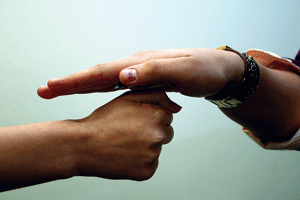 Matt Rubin
Matt RubinWashington University junior Marc Elliot balked at his friend’s suggestion. But junior Mike Gorodinsky insisted that Eliott give the St. Louis Rock Paper Scissors (RPS) Tournament of Champions a chance. The tournament, held at the St. Louis Science Center, boasted over 100 members of all ages vying to be dubbed the best RPS player in the Lou.
Afraid of heading into battle without any coaching, Elliot placed a call to University sophomore Adam Low’s younger brother, Danny. The younger Low started an RPS club in his high school in Kirkland, Wash. and is also a member of the World RPS Society.
The Society, which has its National Championship in Toronto costs $35 to enter, but allows its members to compete in tournaments worldwide. Low then taught Elliot what he called “RPS Strategy 101” in preparation for the tournament.
His new knowledge in hand, Elliot set out to take home the title that every kid dreams of: “Rock Paper Scissors Champion.” All participants lined up, prepared for action. The stage had three tables prepared for competition, all equipped with referees, which were employees from Gold’s Gym. Each match was simply best of three throws- ties not included – and at the completion of each round the field was cut in half.
“Just close your eyes and imagine over 100 people, a live band, people in costume and a huge stage with three tables all with refs,” said Elliot.
Nervous for his first match, Elliot faced off against a seven-year-old girl. This particular girl was anxious as well, as she twice threw on “scissors” rather than “shoot,” causing her to be disqualified and Elliot advanced to the next round.
After five rounds, only six contestants remained, pitting Elliot and two other contestants to battle in order to narrow the field down to four.
Opting for a three-way challenge, the first person to two points would advance. After two ties, in which each threw rock, paper and scissors, Elliot ousted both opponents at once, throwing rock to their scissors and elevating him into the semifinals.
Playing in the first of the two semifinal matches, Elliot quickly disposed of yet another seven-year-old, thereby placing Elliot into the coveted championship round. Observing the other semifinal match, he noticed his soon-to-be 45 year-old foe threw rock on her first throw. Confident she would repeat the strategy, Elliot opted to go with paper on his first throw.
Scissors.
Elliot fell into an early 1-0 hole, needing to win the final two throws in order to take home the title. Elliot thought back to RPS Strategy 101, which states that after a victory, your opponent is likely to change his or her throw and therefore you should keep your throw the same. Elliot threw paper again.
Rock.
Danny Low’s advice came through, and the match was tied 1-1. Elliot thought long and hard about his last throw, and decided to go with rock.
Scissors.
Just like that, Marc was an RPS champion. He was now the proud owner of $150, a year’s membership to Gold’s Gym, but most importantly the St. Louis RPS Champion.
“RPS is a game of 30 percent strategy and 70 percent luck,” said Elliot. “One minute I was a novice getting a five-minute 101 strategy, and the next minute I was on top of the world. The crowd was screaming, cameras in your face, and in the end of the day, all that mattered was whether you threw rock, paper, or scissors.”
The day did not fare as well for Gorodinsky, however. Mike fell in the third round to yet another seven-year-old who allegedly cheated his way through the tournament. Informal investigations are underway, but no formal charges had been filed as of press time.
Suggestions from an expert:
Here are some basic strategies for beginner RPS players. The suggestions come from veteran RPS player Danny Low, whose brother Adam is a sophomore at the University.
1. The most common first throw is scissors.
2. The next most common first throw is rock.
3. Try to judge the personality of your opponent. A more aggressive player is more likely to throw rock. A more timid and shy player is more likely to throw paper.
Obviously, anywhere in between a person would be more likely throw scissors.
4. If you win a round, your opponent’s next throw will most likely be what just beat him or her. For example, if I throw a rock and my opponent throws scissors, my opponent will have a tendency to throw rock next, so my next throw should be paper.
5. If you lose, don’t change your next throw. People have a tendency to change their throw when they win.
6. If you tie, change your next throw to whatever would beat the tie. People tend to not change their throw after a tie.
These next rules are for longer play.
7. If your opponent is losing, they are more likely to throw their strongest or most comfortable throw. Their strongest throw is usually the one they threw first.
8. If your opponent is ahead, they are more likely to become looser in their throws, since now they have some room to take risks.